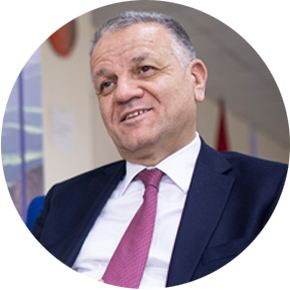Mediamax’s interview with former U.S. Ambassador to Azerbaijan Richard Kauzlarich
In 1990s, Richard Kauzlarich was the U.S. Ambassador to Azerbaijan and Bosnia and Herzegovina. During his 32-year diplomatic career, Richard Kauzlarich held various posts at the U.S. Department of State.
Last week the U.S. diplomat published an article titled “The Heydar Aliyev Era Ends in Azerbaijan Not with a Bang but a Whisper” in which he criticized the policy of Ilham Aliyev’s administration.
In his article, Richard Kauzlarich also touched upon the possible ways to step up Karabakh conflict negotiation process. In particular, he suggested that the parties appoint fully-empowered negotiators who will conduct face-to-face discussions based on the framework the Minsk Group has provided but without Minsk Group direct mediation.
Mediamax asked Richard Kauzlarich to elaborate on his proposals.
- You have suggested that both sides should appoint “fully-empowered negotiators” to conduct face-to-face discussions based on the framework the Minsk Group has provided “but without Minsk Group direct mediation”. Why you think that Co-Chairs’ direct mediation is not needed any more?
- It’s time to recognize that the Minsk Group has identified the parameters for an N-K agreement and that the parties need to take ownership of these ideas and negotiate directly. The parties do not need the Minsk Group to negotiate the final deal. If Armenia and Azerbaijan won’t negotiate in good faith directly then there’s not much more the Minsk Group can do.
- In past there were direct talks between Armenian and Azerbaijani Presidents’ Advisors Gerard Libaridian and Vafa Guluzade, later Presidents Kocharian and Aliyev appointed Deputy Foreign Ministers Tatul Margarian and Tofig Zilfugarov as their Personal Representatives. However, those formats haven’s produced any visible results. Why you think that such format could be sustainable today?
- I agree this is not a new format but I would re-introduce it now because the Minsk Group process has developed a foundation for the settlement that did not exist in the 1990s when I was involved as US Ambassador in Azerbaijan. Rather than blaming the Minsk Group for the lack of progress toward a peaceful settlement, Baku and Yerevan would be responsible for showing the Armenian and Azerbaijani people that the political leadership was more prepared to take risks for peace than risks for war.
- If you suggest to “distance” from OSCE MG, don’t you think it will make more sense to restore the full negotiating format and to organize talks between Armenian, Azerbaijani and NK negotiators as it was in mid-90s?
- The format must be direct, bilateral, Azerbaijan-Armenia negotiations.
- Many people in Armenia believe that President Aliev puts pressure on the civil society and on the people engaged in contacts with Armenians because he prepares for war. What you think?
- Both sides, I regret to say, are preparing for war but in different ways. Why do I say that? Because Baku and Yerevan have only created conditions where military conflict rather than peaceful compromise is the only politically acceptable outcome for the people in both countries. Until the political leaderships in both countries have prepared their populations to accept a compromise, peaceful settlement to the conflict that does not include the extreme, zero-sum outcomes that currently are the public positions, it is hard to imagine diplomacy working.
- Don’t you think that any resolution of the conflict will not be possible as long as President Aliev is not ready to accept that Nagorno-Karabakh will not return under the Azerbaijani rule?
- The current impossible situation is not the creation of a single party. Over the years the Minsk Group framework has advanced a number of different alternatives to the “all-or-nothing” positions on ending the conflict and the peaceful future of Nagorno Karabakh. Until Armenia and Azerbaijan (a) commit to (through direct bilateral negotiations) a diplomatic and peaceful solution to the conflict, (b) demonstrate willingness to take risks for peace, and (3) regard the Minsk-Group mechanism as a partnership rather than a punching bag to blame for the lack of progress; there is little hope that the current approach will succeed.
Ara Tadevosyan talked to Richard Kauzlarich


























Comments
Dear visitors, You can place your opinion on the material using your Facebook account. Please, be polite and follow our simple rules: you are not allowed to make off - topic comments, place advertisements, use abusive and filthy language. The editorial staff reserves the right to moderate and delete comments in case of breach of the rules.